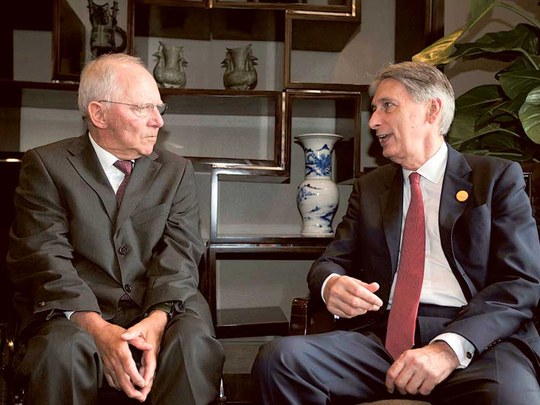
Chengdu, China: The world’s leading economies must do more to boost slowing global growth, the International Monetary Fund and Washington urged as G20 finance ministers gathered on Saturday, with Britain’s vote to leave the European Union threatening more disruption.
Central bank chiefs and finance ministers from the world’s top 20 economies met in the southwestern Chinese city of Chengdu, and US Treasury Secretary Jacob Lew told journalists it was “a time of continuing uncertainty in the global economic outlook”.
“When you look at the political developments around the world, most recently the referendum in the United Kingdom, it really reinforces the importance of concentrating on shared growth,” he said.
Britain’s new finance minister Philip Hammond on Saturday met his German counterpart Wolfgang Schaeuble for the first time, and held talks with Chinese central bank chief Zhou Xiaochuan.
“In Chengdu for G20 – will be reassuring world that Britain is open for business & will continue to be a competitive open trading nation,” Hammond tweeted.
According to a draft communique, the G20 will seek to stress that the impact of Brexit can be tackled, Bloomberg News reported.
“Members of the G20 are well positioned to proactively address the potential economic and financial consequences stemming from the UK referendum,” it quoted the draft document as saying.
Just ahead of the meeting, the IMF called on key G20 nations to boost government spending.
“Global growth remains weak, and downside risks have become more salient,” the Washington-based lender said in a report. “Growth could be even lower if the current increases in economic and political uncertainty in the wake of the ‘Brexit’ vote continue.”
In its most recent forecast, the IMF lowered its forecasts for global growth this year and next by 0.1 per cent, to 3.1 per cent and 3.4 per cent respectively.
The IMF wants advanced economies such as Germany and the United States to channel more public spending into infrastructure investment to help boost growth, an issue that has sparked divisions among G20 members.
“There is an urgent need for G20 countries to step up their efforts to turn growth around,” it said.
But Berlin, in particular, has a long history of fiscal rigour and argues that government spending is ineffective at boosting growth, while monetary moves such as ultra-low interest rates and a flood of liquidity and credit are counterproductive.
Ahead of the G20 gathering, a German ministerial source told reporters that the use of government stimulus would not be one of the meeting’s main themes.
But French finance minister Michel Sapin told AFP that as well as monetary policy, which could not “do everything”, fiscal policy should be used “as much as possible”.
“Different countries are in different situations,” he said, and governments that had room to support investment should do so, “even if one country or another disagrees”.
Other challenges loom besides Brexit, including what one official at the G20 referred to as the “Three Ts” – terrorism, Turkey and Trump.
The recent attack in the French city of Nice which killed 84 people, the third major incident in the European country over the past 18 months, has rattled financial markets, and a gunman in the German city of Munich killed nine people on Friday.
A failed coup in Turkey which had aimed at unseating President Recep Tayyip Erdogan, and his huge subsequent crackdown on opponents, has alarmed Ankara’s Western allies.
Turkey’s Deputy Prime Minister Mehmet Simsek sought to reassure his colleagues.
“Despite what has happened a week ago in Turkey... we will continue to strongly adhere to democratic principles and apply rule of law, and not much really has changed,” he said.
The US presidential election, in which tycoon Donald Trump has sealed the Republican party nomination and will face Democrat Hillary Clinton, could add uncertainty if the contest is close.
In sharp contrast to an earlier G20 finance ministers meeting in February, attendees appeared less concerned about a slowdown in China’s economy – a key driver of global growth – and persistent weakness in its yuan currency.
The Asian giant expanded 6.9 per cent in 2015 – its weakest annual rate in a quarter of a century – as Beijing navigates a difficult transition to more sustainable growth.
Chinese Premier Li Keqiang on Friday said that the world cannot depend on his country alone to save it from a Brexit-induced downturn.
“It is impossible to carry all of the burden of the whole world on our shoulders,” he told leaders of multi-lateral financial institutions in Beijing.












